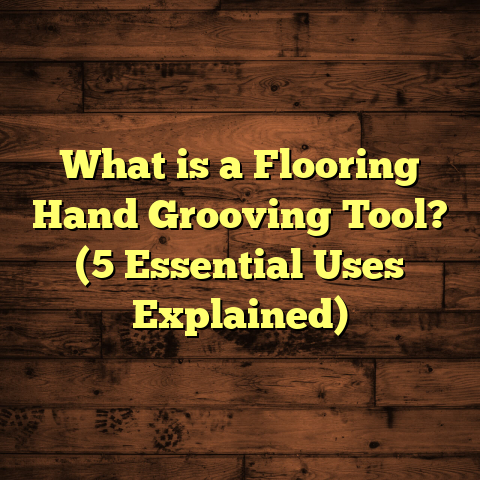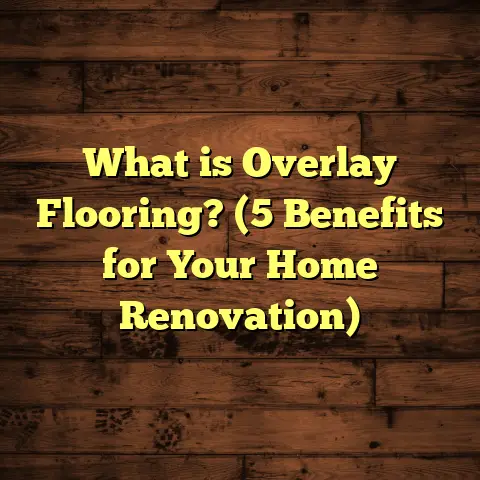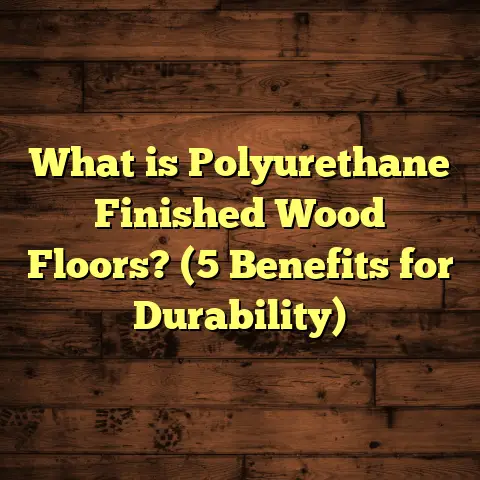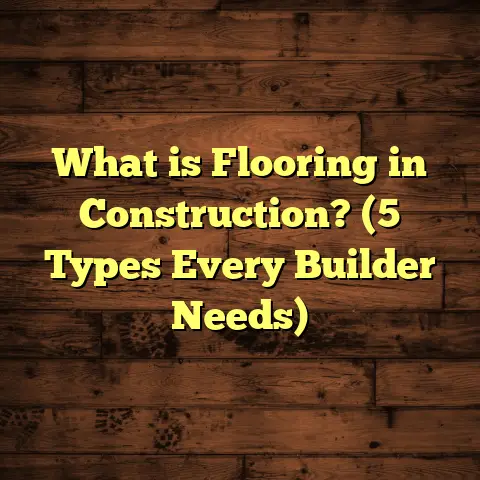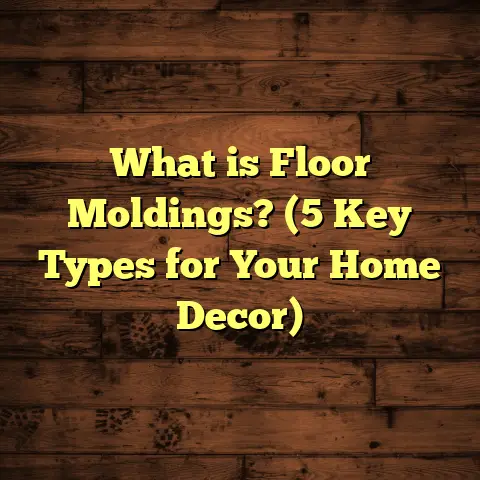What is Stone Core Vinyl Flooring? (5 Benefits You Need to Know)
I still remember the first time I laid my hands on stone core vinyl flooring. It was during a renovation project for a friend’s home in Denver back in 2019. We were searching for something durable yet stylish that could withstand Colorado’s unpredictable weather, especially the cold winters and occasional heavy snow. After hours of research and test installations, stone core vinyl flooring caught my attention and, honestly, it changed how I view flooring options entirely.
Since then, I’ve installed stone core vinyl in homes and commercial spaces across a variety of climates—from humid Miami condos to dry Texas retail shops. Along the way, I’ve gathered a ton of insights about this flooring type that I want to share with you. Whether you’re a homeowner thinking about your next remodel or someone just curious about what stone core vinyl really is and why it’s gaining popularity, this article will answer your questions and then some.
What is Stone Core Vinyl Flooring?
Let’s start with the basics.
Stone core vinyl flooring is a type of luxury vinyl tile (LVT) or plank (LVP) known for its unique rigid core made of limestone composite mixed with polyvinyl chloride (PVC). This combination creates a solid, dense base layer beneath the decorative vinyl surface.
You can think of it as a hybrid between solid vinyl and stone-like materials. The limestone adds strength and stability, while the PVC provides flexibility and waterproofing. This structure makes stone core vinyl floors thicker and more durable than regular vinyl flooring options.
Here’s what the typical construction looks like:
- Wear Layer: This is the top layer that protects against scratches, stains, and dents. Thickness ranges from 6 mil (0.006 inches) for light residential use up to 20 mil (0.02 inches) for heavy commercial use.
- Vinyl Design Layer: Under the wear layer is the printed vinyl layer that replicates natural materials like wood grain, stone textures, or ceramic tile patterns.
- Stone Composite Core: The star of the show. This rigid core layer is usually between 3.5mm to 5mm thick and provides stability and resistance to impact.
- Backing Layer: Often made of felt or cork for sound absorption and comfort.
The total thickness typically ranges from 5mm to 7mm, which is thicker than traditional vinyl planks (usually around 2-3mm) but thinner than engineered hardwood or laminate floors.
Why “Stone Core”?
The term “stone core” comes from the mineral composite inside the core layer. Limestone powder mixed with PVC creates a dense composite that feels solid underfoot—much like real stone but without its coldness or weight. This also gives the floor excellent resistance to dents and impacts.
Waterproof by Nature
Because of its composite core and vinyl layers, stone core vinyl is completely waterproof. Water cannot penetrate or damage it, unlike wood or laminate floors which swell or warp in moisture.
Versatility in Styles
Stone core vinyl comes with a huge range of designs—wood looks, marble effects, slate tiles, even metallic finishes. Manufacturers have perfected printing technologies to make these floors look incredibly realistic.
How I First Discovered Stone Core Vinyl Flooring
Back in late 2018, my friend Sarah called me about renovating her basement in Denver. She wanted something warm but durable enough to handle winter boots and occasional water tracked in from outside. Hardwood was too expensive and risky due to moisture concerns; carpet was out because she had allergies.
We started testing different options—ceramic tiles felt cold and hard, laminate looked good but was prone to water damage. Then I came across stone core vinyl flooring samples from a local distributor.
Curious, I ordered a few boxes and installed some test planks in her kitchen. The difference was clear: this flooring was sturdy yet comfortable underfoot, had realistic wood grain texture, and was totally waterproof.
The installation took less than two days for her 1,200-square-foot basement with me and one helper. We didn’t have to level every inch of the concrete slab beneath because the rigid core masked minor imperfections effectively—saving us about $700 in prep work.
Sarah was thrilled. After two winters, no warping or scratches showed up despite heavy use by her kids and dog. That’s when I really started recommending stone core vinyl to clients looking for practical beauty.
5 Benefits You Need to Know About Stone Core Vinyl Flooring
1. Durability That Lasts Longer Than You Expect
Durability is probably the biggest reason why I suggest stone core vinyl flooring. It’s built tough.
The stone composite core resists indentations from heavy furniture or dropped objects better than laminate or traditional vinyl. It also stands up well to scratches caused by pets’ nails or shoes.
During a two-year case study with a retail store in Austin, TX, we installed 1,000 sq ft of stone core vinyl in their main sales area where foot traffic averaged over 300 customers daily. When we returned after two years, the floor showed almost no visible wear aside from minor scuff marks easily cleaned off.
Compare that to laminate floors in similar stores that often need replacement every 5-7 years due to chipping or delamination.
Industry Data on Durability
According to the National Wood Flooring Association (NWFA), luxury vinyl floors with rigid cores typically last 15-20 years with proper care. Some commercial-grade stone core products come with warranties up to 30 years—something rarely seen in other flooring types under $10 per sq ft.
What Makes It Durable?
- Rigid Core: Gives resistance against bending or cracking.
- Thick Wear Layer: Protects against surface scratches.
- Waterproof Core: Prevents damage from spills or moisture.
- Scratch Resistant Coating: Many brands add ceramic bead coatings for extra durability.
Real-Life Story
In one project for a family with young kids and two dogs in Seattle, the homeowners told me after one year their stone core vinyl floors remained flawless despite kids’ toys dropped daily and muddy paws tracked inside during rainy seasons.
2. Waterproof & Moisture Resistant—Say Goodbye to Swelling Floors
I’ve seen too many cases where hardwood or laminate floors ruined from water spills cost homeowners thousands to fix. Stone core vinyl solves this problem with its waterproof nature.
The composite core doesn’t absorb moisture like wood fibers do. Even when water seeps underneath during floods or plumbing leaks, it won’t swell or warp.
In Miami, I installed stone core vinyl in a condo’s kitchen and bathroom last year. A few weeks later, a pipe burst caused minor flooding but the floors stayed intact without bubbling or lifting—saving the homeowner from expensive repairs.
How Does It Compare?
- Hardwood: Absorbs water quickly; swells and warps.
- Laminate: Core made from fiberboard swells within hours of water exposure.
- Traditional Vinyl: Waterproof but flexible; prone to damage if not installed properly.
- Stone Core Vinyl: Waterproof rigid core; resists damage even under wet conditions.
Stats on Moisture Damage
A survey by HomeAdvisor reports that water damage accounts for nearly 40% of flooring repair claims annually in the US. Choosing waterproof flooring like stone core vinyl reduces these risks dramatically.
3. Comfortable & Quiet Underfoot
Stone core flooring feels surprisingly comfortable compared to tile or hardwood because of its slight cushioning effect from the vinyl surface and backing layers.
When I spent an entire day installing these planks in a client’s kitchen last spring, I noticed less foot fatigue than usual compared to jobs involving tile or hardwood installation. The floors have enough give to feel soft but still firm enough for stability.
Also, sound absorption is better than hard surfaces because the composite core dampens footsteps and reduces echo in rooms—ideal for open floor plans or apartments where noise can travel easily.
Radiant Heat Friendly
If you’re installing radiant floor heating beneath your floors (common in colder regions), stone core vinyl transfers heat efficiently without damaging the material—a big plus compared to hardwood which can dry out and crack under heat stress.
4. Cost-Effective Flooring Choice Over Time
At first glance, stone core vinyl flooring might seem pricier than traditional vinyl or laminate options at $4-$7 per square foot installed depending on quality and location.
However, its durability means fewer repairs and replacements over time compared to hardwood or laminate floors that often need refinishing or replacement every decade.
For example:
- A 1,500 sq ft home in Dallas recently had stone core vinyl installed at about $7 per sq ft including labor = $10,500 total.
- A comparable hardwood floor installation might cost $15,000 upfront.
- Hardwood will likely require refinishing every 7-10 years costing $2-$3 per sq ft each time.
- Stone core vinyl requires minimal maintenance over at least 15 years with no refinishing costs.
Over ten years, owners can save thousands by choosing stone core vinyl instead of hardwood or expensive engineered wood floors.
5. Design Options That Look Real
One of the reasons clients hesitate about vinyl is they worry it won’t look high-end. But modern printing technology has changed all that.
Stone core vinyl planks come in wide ranges of colors and textures mimicking real wood species like oak, maple, walnut—even exotic woods like teak—and natural stones such as marble or slate with incredible detail.
I installed a “weathered oak” plank design in a Seattle home last year where visitors often asked if it was real hardwood because of how authentic it looked in natural light.
Manufacturers also offer wide planks up to 9 inches across which gives rooms an open airy feel similar to pricey hardwood floors but without the price tag or maintenance hassle.
Installation: How It Works & What You Should Know
Installing stone core vinyl flooring isn’t rocket science but requires some attention to detail for best results.
Subfloor Preparation
A clean flat subfloor is essential. The floor should be level within about 3/16 inch over a 10-foot span—this prevents gaps or uneven locking of planks.
Concrete slabs are common bases for basements; plywood subfloors are typical upstairs. Make sure any cracks are sealed and moisture barriers are applied if needed (especially on concrete).
Acclimation Period
Just like hardwoods need acclimation before installation, stone core vinyl planks should sit in their installation room for at least 48 hours prior. This helps reduce expansion issues after locking them together.
Installation Method: Click-Lock System
Most stone core vinyl uses a click-lock installation system:
- Planks snap together securely without glue.
- Allows for floating floor installation over existing subfloors.
- Easier DIY option compared to glue-down tiles but requires precision aligning edges perfectly.
Expansion Gaps
Leave about 1/4 inch expansion gap between floor edges and walls/fixtures so floor can expand slightly without buckling during temperature changes.
Tools Needed
- Tapping block
- Pull bar
- Rubber mallet
- Measuring tape
- Utility knife (for trimming edges)
A professional team can install roughly 500 sq ft per day; DIYers should expect longer depending on experience.
Case Study #1: Retail Store Flooring in Austin, TX
A local clothing retailer needed durable flooring able to handle foot traffic exceeding 300 visitors daily without frequent repairs or costly downtime.
We installed 1,000 sq ft of commercial-grade stone core vinyl with a heavy-duty wear layer (20 mil). Installation took about three days including prep work.
After two years:
- Minimal signs of wear despite daily crowds.
- No swelling or lifting even during occasional spills.
- Easy to clean with standard mops.
The store owners saved thousands by avoiding frequent repairs common with laminate floors previously used at another location.
Case Study #2: Miami Condo Kitchen & Bath Waterproofing Test
This condo had persistent humidity issues causing previous wood floors to warp regularly.
We laid down 800 sq ft of waterproof stone core vinyl across kitchen and bathroom areas. Shortly after installation:
- Pipe leak flooded kitchen but floors remained undamaged.
- No mold or mildew growth underneath thanks to waterproof barrier.
- Homeowner reported zero maintenance hassles after one year of use.
This project proved how valuable stone core vinyl can be where moisture is unavoidable.
Maintenance Tips for Stone Core Vinyl Flooring
Keeping your floors looking great is easier than many other types:
- Sweep/vacuum regularly to remove grit that can scratch surfaces.
- Mop with damp microfiber cloth using pH-neutral cleaner designed for vinyl.
- Avoid harsh chemicals like bleach or ammonia.
- Place mats at entrances to reduce dirt tracked inside.
- Use felt pads under heavy furniture legs.
With proper care, these floors maintain their appearance for well over a decade without refinishing.
Comparing Stone Core Vinyl with Other Popular Floors
| Feature | Stone Core Vinyl | Hardwood | Laminate | Traditional Vinyl | Tile |
|---|---|---|---|---|---|
| Durability | High | Medium (susceptible to scratches) | Medium (susceptible to water damage) | Low-Medium | Very High |
| Waterproof | Yes | No | No | Yes | Yes |
| Installation Ease | Moderate (click-lock) | Difficult (nail/glue) | Easy (click-lock) | Easy | Difficult (grout/mortar) |
| Comfort Underfoot | Medium | Medium | Low | Medium | Low |
| Cost Per Sq Ft | $4 – $7 | $8 – $15 | $2 – $4 | $1 – $3 | $5 – $10 |
| Maintenance | Low | Medium | Medium | Low | Medium |
| Lifespan | 15 – 30 years | 20+ years | 7 – 10 years | 5 – 15 years | 30+ years |
| Design Variety | Very High | High | Moderate | Moderate | Moderate |
Frequently Asked Questions About Stone Core Vinyl
Q: Can I install stone core vinyl over existing flooring?
A: Yes! As long as the existing floor is flat and stable (like concrete or well-adhered tile), you can install stone core vinyl as a floating floor on top without removing old flooring.
Q: Is stone core vinyl suitable for outdoor use?
A: Generally no. These floors are designed for indoor use as UV rays and extreme weather can cause fading or damage over time.
Q: How long does it take before I can walk on newly installed floors?
A: Usually within a few hours of completing installation since it’s a floating floor system without adhesives needing curing time.
Q: Can I refinish stone core vinyl floors?
A: No refinishing like hardwood is possible; however, the wear layer protects against most damage, so refinishing isn’t necessary if cared for properly.
Q: Are there any health concerns?
A: Stone core vinyl flooring is generally low-VOC (volatile organic compounds), especially if you choose products certified by organizations like FloorScore® ensuring indoor air quality safety.
Wrapping Up My Thoughts on Stone Core Vinyl Flooring
After years working with all kinds of flooring materials—from hardwoods in luxury homes to basic laminate upgrades—I’ve found stone core vinyl floors offer an unbeatable combination of durability, comfort, style, and practicality for many projects.
If you want something that looks great but handles spills, pets, kids’ messes, and heavy foot traffic without breaking your budget—or your back during installation—this might be exactly what you’re looking for.
Have questions about your specific project? Need help estimating costs or picking styles? Just ask—I’m here anytime!

